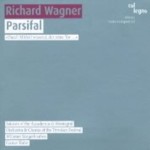If you compare the timings of this performance (3:37:26) with, say, an un-Knappertsbuschian/Toscaninian reading such as Barenboim’s on Teldec (4:16:25) you would conclude that this performance must be severely abridged. But it is merely incredibly fast. (Boulez led a 1970 Bayreuth performance that lasted just 3:39, so it’s not unprecedented.) The difference is so vast that it might seem disruptive, but it is not. Gone are dozens of pauses; uplifting, positive moments of the score are given brisker tempos, in a truly celebratory vein. Perhaps some of the gravity of Act 1 is eliminated, but Amfortas’ suffering, in both Acts 1 and 3, is almost unbearable when taken fast: a fascinating discovery.
The performance comes from the Tyrolean Festival in Erl, Austria, where a few years ago director/conductor Gustav Kuhn presented the Ring Cycle (without Das Rheingold) in a 24-hour period. The 1500-seat, acoustically brilliant (so said Sergiu Celibadache) hall was built to perform a Passion Play every six years; it lay fallow the rest of the time until the town gave Kuhn his festival.
The orchestral playing and choral work in this performance are invariably brilliant; the solo singing is invariably less so. Kuhn makes an odd choice or two. After the Prelude the orchestra stops and a solo organ accompanies Gurnemanz’s opening words; similarly, an organ is used in the Transformation music later in the act. This is unheard of, as far as I know. It doesn’t sound bad, but what’s next–a cello? In addition, for a hall with supposedly great acoustics, the recording lacks presence (the orchestra is behind the soloists).
The soloists are respectable and occasionally more-so. They are all admirably sensitive to the text, but there really isn’t a Vickers or Moll or Neidlinger or Frick in the crowd. Manfred Hemm, the only singer I’d previously heard, lacks gravitas as Gurnemanz, although that might be Kuhn’s point, using such quick tempos: Gurnenemanz as EveryChristian. He sings well. Michael Baba’s Parsifal has the right color and volume, and he’s quite good in the second act, but I won’t recall any specific moments. Thomas Gazheli’s Amfortas is wonderful in Act 3–tormented and agitated. There is little to like in Martina Tomcic’s raw-sounding Kundry; an intelligent interpretation is sabotaged by an unpleasant sound. In short, another Parsifal for the curious, but not nearly on a par with the greats: Kubelik on Arts, Knappertsbusch on Golden Melodram (1964), Barenboim on Teldec, Karajan on DG.
































